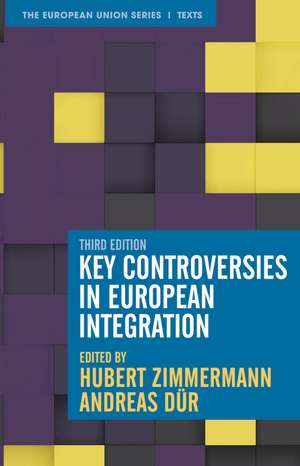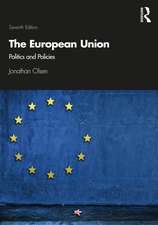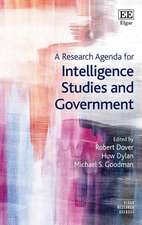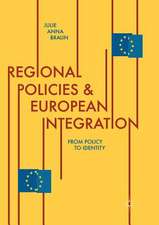Key Controversies in European Integration: The European Union Series
Autor Hubert Zimmermann, Andreas Düren Limba Engleză Paperback – 2 mar 2021
| Toate formatele și edițiile | Preț | Express |
|---|---|---|
| Paperback (1) | 232.17 lei 3-5 săpt. | +54.72 lei 4-10 zile |
| Bloomsbury Publishing – 2 mar 2021 | 232.17 lei 3-5 săpt. | +54.72 lei 4-10 zile |
| Hardback (1) | 716.56 lei 6-8 săpt. | |
| Bloomsbury Publishing – 2 mar 2021 | 716.56 lei 6-8 săpt. |
Din seria The European Union Series
- 10%
 Preț: 266.43 lei
Preț: 266.43 lei - 12%
 Preț: 231.01 lei
Preț: 231.01 lei - 18%
 Preț: 256.59 lei
Preț: 256.59 lei -
 Preț: 265.76 lei
Preț: 265.76 lei - 30%
 Preț: 774.12 lei
Preț: 774.12 lei -
 Preț: 263.72 lei
Preț: 263.72 lei - 30%
 Preț: 776.58 lei
Preț: 776.58 lei - 12%
 Preț: 226.42 lei
Preț: 226.42 lei - 18%
 Preț: 257.50 lei
Preț: 257.50 lei -
 Preț: 265.47 lei
Preț: 265.47 lei - 17%
 Preț: 256.89 lei
Preț: 256.89 lei - 6%
 Preț: 239.59 lei
Preț: 239.59 lei - 14%
 Preț: 198.22 lei
Preț: 198.22 lei - 17%
 Preț: 240.98 lei
Preț: 240.98 lei - 12%
 Preț: 238.31 lei
Preț: 238.31 lei - 13%
 Preț: 251.28 lei
Preț: 251.28 lei - 31%
 Preț: 772.74 lei
Preț: 772.74 lei -
 Preț: 268.68 lei
Preț: 268.68 lei -
 Preț: 258.89 lei
Preț: 258.89 lei - 18%
 Preț: 270.20 lei
Preț: 270.20 lei - 14%
 Preț: 832.17 lei
Preț: 832.17 lei -
 Preț: 265.18 lei
Preț: 265.18 lei - 18%
 Preț: 271.40 lei
Preț: 271.40 lei - 22%
 Preț: 273.24 lei
Preț: 273.24 lei -
 Preț: 271.58 lei
Preț: 271.58 lei -
 Preț: 269.94 lei
Preț: 269.94 lei - 14%
 Preț: 771.75 lei
Preț: 771.75 lei -
 Preț: 320.93 lei
Preț: 320.93 lei - 21%
 Preț: 280.55 lei
Preț: 280.55 lei -
 Preț: 263.92 lei
Preț: 263.92 lei - 18%
 Preț: 271.14 lei
Preț: 271.14 lei - 16%
 Preț: 259.19 lei
Preț: 259.19 lei -
 Preț: 270.49 lei
Preț: 270.49 lei - 18%
 Preț: 269.76 lei
Preț: 269.76 lei - 14%
 Preț: 775.19 lei
Preț: 775.19 lei - 22%
 Preț: 269.76 lei
Preț: 269.76 lei - 14%
 Preț: 270.20 lei
Preț: 270.20 lei
Preț: 232.17 lei
Preț vechi: 265.77 lei
-13% Nou
Puncte Express: 348
Preț estimativ în valută:
44.44€ • 48.29$ • 37.35£
44.44€ • 48.29$ • 37.35£
Carte disponibilă
Livrare economică 31 martie-14 aprilie
Livrare express 14-20 martie pentru 64.71 lei
Preluare comenzi: 021 569.72.76
Specificații
ISBN-13: 9781352011906
ISBN-10: 1352011905
Pagini: 296
Dimensiuni: 155 x 235 x 20 mm
Greutate: 0.41 kg
Ediția:3rd ed. 2021
Editura: Bloomsbury Publishing
Colecția Bloomsbury Academic
Seria The European Union Series
Locul publicării:London, United Kingdom
ISBN-10: 1352011905
Pagini: 296
Dimensiuni: 155 x 235 x 20 mm
Greutate: 0.41 kg
Ediția:3rd ed. 2021
Editura: Bloomsbury Publishing
Colecția Bloomsbury Academic
Seria The European Union Series
Locul publicării:London, United Kingdom
Caracteristici
A highly accessible and stimulating text for those studying Europe and the European Union
Notă biografică
Hubert Zimmermann is Professor of International Relations at Philipp University of Marburg. He also taught at Cornell University (Ithaca, NY), Heinrich-Heine University, Düsseldorf, and Ruhr-University, Bochum. He received his PhD from the European University Institute, Florence. He has published on EU foreign economic and security policies, transatlantic relations, and international monetary and financial issues.Andreas Dür is Professor of International Politics at the University of Salzburg. He holds a PhD from the European University Institute in Florence. Prior to taking up his current position, he was a research fellow at the Mannheim Centre for European Social Research and a lecturer at University College Dublin. Dür has published nearly 50 peer-reviewed articles on trade policy, interest group politics, and European integration. His most recent books are Insiders versus Outsiders: Interest Group Politics in Multilevel Europe (Oxford University Press, 2016) and The Political Influence of Business in the European Union (University of Michigan Press, 2019).
Cuprins
Introduction 1. The European Union: Success or Failure? Why Europe Works; John McCormick The Rise and Fall of the EU; Jan Zielonka 2. More Powers for Brussels or Renationalization? A Stronger, More Supranational Union; Derek Beach The New Intergovernmentalism and European Integration; Uwe Puetter 3. How Democratic is the EU? The Inevitability of a Democratic Deficit; Richard Bellamy A Democratic Achievement, Not Just a Democratic Deficit; Christopher Lord 4. Too Much Power for the Judges? Understanding the European Court's Political Power; Karen Alter and Daniel Kelemen A Strange Institution; Jeremy Rabkin 5. Can There Be A Common European Identity? European Identity Formation in (the) Crisis; Ulrike Liebert A Common European Identity is an Illusion; Jonathan White 6. Lobbying in the EU: How Much Power for Big Business? Still Influential After All These Years Corporate Interests in the EU; Laura Horn and Angela Wigger The Diminishing Power of Big Business; David Marshall 7. The Uncertain Future of the Euro Why the Euro is a Functional Necessity in the Process of European Integration; Henrik Enderlein For a Plurality of Economic and Social Models! Against the Uniform Euro State!; Andreas Nölke 8. Can the EU Tame Big Finance? The Merits of Adaptive Governance: The Regulation of Financial Services in the EU; Jörn Carsten Gottwald The Pitfalls of EU Governance in Financial Markets; Daniel Mügge 9. The Big Waste? The Common Agricultural Policy The CAP: Dilemmas and Facts; Anastassios Haniotis The Common Agricultural Policy: an Environmental, Social and Sanitary Failure; Eve Fouilleux 10. Does the EU Act as a Normative Power? The EU as Normative Power; Daniela Sicurelli Living in a Material World: A Critique of 'Normative Power Europe'; Mark Pollack 11. Has EU Enlargement Gone Too Far? The Case for European Union Enlargement; Rachel Epstein EU Enlargement: A Critique; Christopher J. Bickerton 12. Towards A Common European Army? The European Union's CSDP: the Great Illusion; Luca Ratti Defence Integration in the EU: From Vision to Business-as-Usual; Hanna Ojanen 13. Britain's Decision to Leave the EU: Good or Bad? In Defence of Brexit; Christopher J. Bickerton Brexit-a Political and Economic Disaster for Britain; Martin Rhodes 14. New German Hegemony: Does It Exist, And Is It Dangerous? A Benign Hegemon: Germany's European Vocation; Miguel Otero-Iglesias and Hubert Zimmermann The Failure of German Leadership; Matthias Matthijs 15. What Future for the Transatlantic Partnership? Dis-Atlanticism: The West in an Era of Global Fragmentation; Rawi Abdelal and Ulrich Krotz A Transatlantic Strategy for the Liberal Order; Bart Szewzyk Conclusion.
Recenzii
For the past decade, this has been one of the go-to titles for understanding the key tensions in the process of European integration: thoughtful and stimulating, it offers a window to the basic questions that drive both academic study and political debate around the European Union. Bringing together an impressive line-up of authors, it highlights the vibrancy of European Studies.
Key Controversies in European Integration' is tackles the big debates that have dominated EU politics in the recent past. It includes an A-list of EU scholars and is highly accessible through its format of juxtaposing two opposing views on each of these debates. Essential reading for students, scholars and policy-makers alike.
By using fundamental and topical controversies as guiding structure, this textbook stands apart from the many classic overviews of European integration. The editors have brought together some of the finest scholars from the various disciplines that study the EU. All contributors provide well-informed, coherent and sometimes provoking arguments regarding key issues of both EU integration and politics. The approach is particularly useful for more advanced students and highly recommended for courses that put debates and discussion at the core of their teaching. Likewise, scholars of European integration will also enjoy the synthesizing, yet innovative, argumentation put forward in many of its chapters.
This impressive textbook brings together the expertise of leading researchers and offers a comprehensive and up-to-date resource for the students of the European Union. Going beyond the traditional descriptive style, this unique collection provides a much-needed critical angle. Its well-structured chapters address the most salient controversies in European integration and arm the students with arguments on both sides of these debates.
The project of a European integration has its history of crises and fundamental challenges. The chapters of this timely new edition provide critical insights into the ups and downs of a unique political endeavour.
This book is unique in its presentation of key issues and debates in European Integration, and shows how political struggles have shaped the European Union. It provides a welcome tool for teaching European Integration in a more critical fashion.
Key Controversies in European Integration' is tackles the big debates that have dominated EU politics in the recent past. It includes an A-list of EU scholars and is highly accessible through its format of juxtaposing two opposing views on each of these debates. Essential reading for students, scholars and policy-makers alike.
By using fundamental and topical controversies as guiding structure, this textbook stands apart from the many classic overviews of European integration. The editors have brought together some of the finest scholars from the various disciplines that study the EU. All contributors provide well-informed, coherent and sometimes provoking arguments regarding key issues of both EU integration and politics. The approach is particularly useful for more advanced students and highly recommended for courses that put debates and discussion at the core of their teaching. Likewise, scholars of European integration will also enjoy the synthesizing, yet innovative, argumentation put forward in many of its chapters.
This impressive textbook brings together the expertise of leading researchers and offers a comprehensive and up-to-date resource for the students of the European Union. Going beyond the traditional descriptive style, this unique collection provides a much-needed critical angle. Its well-structured chapters address the most salient controversies in European integration and arm the students with arguments on both sides of these debates.
The project of a European integration has its history of crises and fundamental challenges. The chapters of this timely new edition provide critical insights into the ups and downs of a unique political endeavour.
This book is unique in its presentation of key issues and debates in European Integration, and shows how political struggles have shaped the European Union. It provides a welcome tool for teaching European Integration in a more critical fashion.







